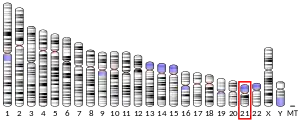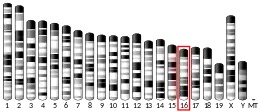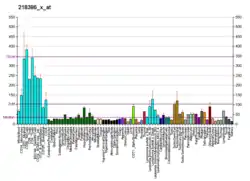USP16
Ubiquitin carboxyl-terminal hydrolase 16 is an enzyme that in humans is encoded by the USP16 gene.[5][6]
This gene encodes a deubiquitinating enzyme that is phosphorylated at the onset of mitosis and then dephosphorylated at the metaphase/anaphase transition. It can deubiquitinate H2A, one of two major ubiquitinated proteins of chromatin, in vitro and a mutant form of the protein was shown to block cell division. Alternate transcriptional splice variants, encoding different isoforms, have been characterized.[6]
References
- GRCh38: Ensembl release 89: ENSG00000156256 - Ensembl, May 2017
- GRCm38: Ensembl release 89: ENSMUSG00000025616 - Ensembl, May 2017
- "Human PubMed Reference:". National Center for Biotechnology Information, U.S. National Library of Medicine.
- "Mouse PubMed Reference:". National Center for Biotechnology Information, U.S. National Library of Medicine.
- Puente XS, Sanchez LM, Overall CM, Lopez-Otin C (Jul 2003). "Human and mouse proteases: a comparative genomic approach". Nat Rev Genet. 4 (7): 544–58. doi:10.1038/nrg1111. PMID 12838346. S2CID 2856065.
- "Entrez Gene: USP16 ubiquitin specific peptidase 16".
Further reading
- D'Andrea A, Pellman D (1999). "Deubiquitinating enzymes: a new class of biological regulators". Crit. Rev. Biochem. Mol. Biol. 33 (5): 337–52. doi:10.1080/10409239891204251. PMID 9827704.
- Maruyama K, Sugano S (1994). "Oligo-capping: a simple method to replace the cap structure of eukaryotic mRNAs with oligoribonucleotides". Gene. 138 (1–2): 171–4. doi:10.1016/0378-1119(94)90802-8. PMID 8125298.
- Suzuki Y, Yoshitomo-Nakagawa K, Maruyama K, et al. (1997). "Construction and characterization of a full length-enriched and a 5'-end-enriched cDNA library". Gene. 200 (1–2): 149–56. doi:10.1016/S0378-1119(97)00411-3. PMID 9373149.
- Cai SY, Babbitt RW, Marchesi VT (1999). "A mutant deubiquitinating enzyme (Ubp-M) associates with mitotic chromosomes and blocks cell division". Proc. Natl. Acad. Sci. U.S.A. 96 (6): 2828–33. Bibcode:1999PNAS...96.2828C. doi:10.1073/pnas.96.6.2828. PMC 15854. PMID 10077596.
- Hattori M, Fujiyama A, Taylor TD, et al. (2000). "The DNA sequence of human chromosome 21". Nature. 405 (6784): 311–9. Bibcode:2000Natur.405..311H. doi:10.1038/35012518. PMID 10830953.
- Wistow G, Bernstein SL, Wyatt MK, et al. (2002). "Expressed sequence tag analysis of human retina for the NEIBank Project: retbindin, an abundant, novel retinal cDNA and alternative splicing of other retina-preferred gene transcripts". Mol. Vis. 8: 196–204. PMID 12107411.
- Strausberg RL, Feingold EA, Grouse LH, et al. (2003). "Generation and initial analysis of more than 15,000 full-length human and mouse cDNA sequences". Proc. Natl. Acad. Sci. U.S.A. 99 (26): 16899–903. doi:10.1073/pnas.242603899. PMC 139241. PMID 12477932.
- Ota T, Suzuki Y, Nishikawa T, et al. (2004). "Complete sequencing and characterization of 21,243 full-length human cDNAs". Nat. Genet. 36 (1): 40–5. doi:10.1038/ng1285. PMID 14702039.
- Lehner B, Sanderson CM (2004). "A protein interaction framework for human mRNA degradation". Genome Res. 14 (7): 1315–23. doi:10.1101/gr.2122004. PMC 442147. PMID 15231747.
- Beausoleil SA, Jedrychowski M, Schwartz D, et al. (2004). "Large-scale characterization of HeLa cell nuclear phosphoproteins". Proc. Natl. Acad. Sci. U.S.A. 101 (33): 12130–5. Bibcode:2004PNAS..10112130B. doi:10.1073/pnas.0404720101. PMC 514446. PMID 15302935.
- Gerhard DS, Wagner L, Feingold EA, et al. (2004). "The status, quality, and expansion of the NIH full-length cDNA project: the Mammalian Gene Collection (MGC)". Genome Res. 14 (10B): 2121–7. doi:10.1101/gr.2596504. PMC 528928. PMID 15489334.
- Rual JF, Venkatesan K, Hao T, et al. (2005). "Towards a proteome-scale map of the human protein-protein interaction network". Nature. 437 (7062): 1173–8. Bibcode:2005Natur.437.1173R. doi:10.1038/nature04209. PMID 16189514. S2CID 4427026.
- Pai MT, Tzeng SR, Kovacs JJ, et al. (2007). "Solution structure of the Ubp-M BUZ domain, a highly specific protein module that recognizes the C-terminal tail of free ubiquitin". J. Mol. Biol. 370 (2): 290–302. doi:10.1016/j.jmb.2007.04.015. PMC 2870993. PMID 17512543.
- Joo HY, Zhai L, Yang C, et al. (2007). "Regulation of cell cycle progression and gene expression by H2A deubiquitination". Nature. 449 (7165): 1068–72. Bibcode:2007Natur.449.1068J. doi:10.1038/nature06256. PMID 17914355. S2CID 4417239.
This article is issued from Wikipedia. The text is licensed under Creative Commons - Attribution - Sharealike. Additional terms may apply for the media files.




